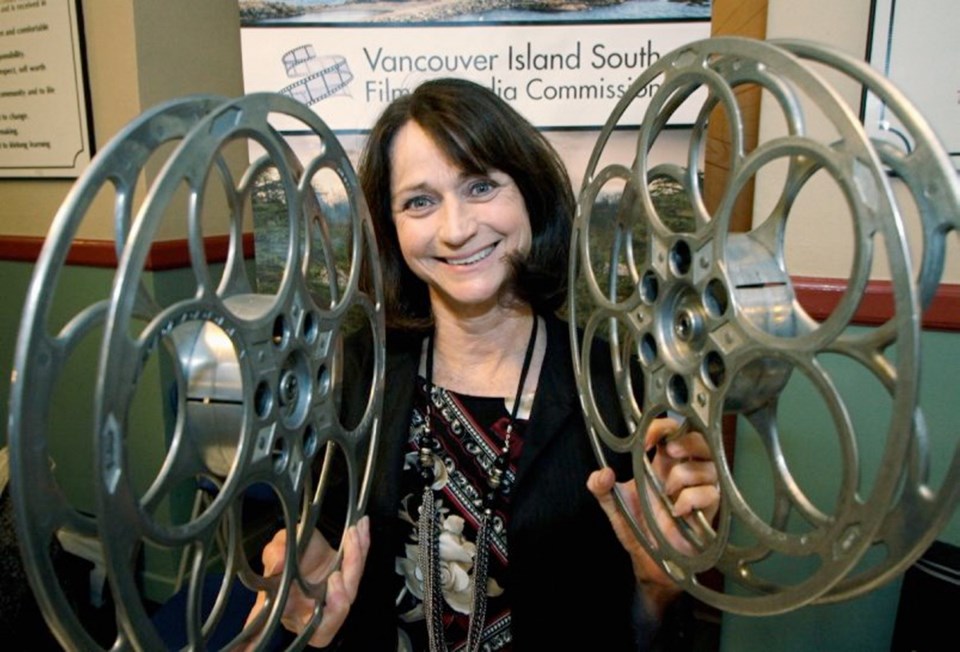During the three decades I covered Vancouver Island’s film and television production scene for the Times Colonist, focusing chiefly on projects shot in our own backyard, I became acutely aware of how beneficial the Vancouver Island South Film and Media Commission had become.
What I did not realize, until I had the luxury of time to take a closer look, was just how busy and resourceful film commissioner Kathleen Gilbert and her small, hardworking staff have been to build, on a shoestring, what many of us take for granted: a thriving local production industry.
In 2015, for instance, production of 24 projects here yielded $18 million in direct spending.
In contrast to the image some might have of Gilbert seated alone at a computer in an office quietly answering telephone inquiries and emails, the scene at commission headquarters upstairs in a heritage building at 514 Government St. on any given day is an eye-opener.
The place is a beehive of activity where Gilbert and her staff — a full-time production services co-ordinator and part-time administrative co-ordinator, with intermittent assistance from a bookkeeper and volunteers — can routinely be found staging a daily production of their own.
Fulfilling the non-profit agency’s mandate to market the Capital Regional District to producers worldwide, their duties include cutting through red tape for producers, providing script breakdowns, locations packages and scouting services, building partnerships with community-minded sponsors, liaising with representatives from all levels of government, planning events such as an upcoming career showcase, encouraging local filmmakers and continuing efforts to build the capital region’s crew base and secure a studio space.
While the commission’s efforts have proven fruitful, increased competition from other jurisdictions and funding cuts are making it more challenging to sustain a recent renaissance. The good news is that, despite cyclical slumps and the loss of some lucrative projects to other regions, the local industry has seen steady growth since implementation of the six per cent Distant Tax Credit, an incentive for producers who film in the capital region.
Our region had originally been excluded from the list of jurisdictions outside the Lower Mainland that were deemed eligible for the tax credit that Gilbert lobbied hard to secure locally.
In recent weeks, the cameras have rolled here on a number of projects, including footage for the supernatural TV series Van Helsing, the Disney feature The Big Sleep and the Hallmark romance Love at First Dance. Other projects on the horizon include a locally filmed TV series inspired by the success of Air Bud Entertainment’s family-friendly Pup Star movies filmed here.
As beneficial as these projects are in terms of economic development, the reality is the commission is being stymied by a funding challenge that demands urgent attention.
While the misconception persists that it is funded in part by fees from production companies it assists, this couldn’t be further from the truth.
The not-for-profit agency, currently running a deficit on its annual operating budget of $200,000, couldn’t operate without corporate sponsorships, membership fees, revenues from fundraisers and annual grants. The bulk of grant money comes from the province, which at last count contributed $40,000, and from the municipalities of Victoria and Saanich. These are augmented by smaller grants from Oak Bay, Esquimalt, Langford, Colwood, View Royal, Metchosin, Sooke, North Saanich and Sidney.
Recent cuts by Victoria and Saanich have reduced municipal funding by more than $35,000, forcing the commission to make do with a total of about $65,000 in municipal grants.
The reality is that funding reductions have made it more challenging for the commission to manage the significant local growth. Thanks in part to overcrowding on the Lower Mainland and an escalating hunger for product by specialty networks and streaming services such as Netflix, the opportunity for more growth here recently reached an all-time high. As wonderful as that might sound, however, such opportunities can’t be fully exploited when the commission is running on fumes.
It’s time for local stakeholders to come up with a more stable solution. It’s essential to ensure longer-term planning can be done by utilizing a more reliable funding mechanism than having staff go cap-in-hand to municipalities for increasingly scarce grant money every year.
The time expended by commission staffers in raising funds to do their jobs would be better spent attracting and facilitating more productions. Having the private sector or local chambers of commerce step up to the plate, or municipalities take on a larger, more sustainable role, are among potential solutions.
There’s no easy answer, but it’s a conversation worth starting to ensure the capital region can maintain its slice of the production pie at a time when opportunity knocks louder than ever.
With a record-breaking $2.6 billion in production business provincewide last year, now is the time for the capital region to get a greater foothold in this industry.
Michael D. Reid is a former film reviewer and columnist for the Times Colonist.



